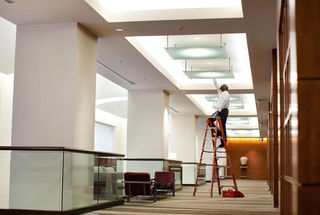Hotel Preventive Maintenance: The Essentials

Committing to preventive maintenance in the hotel industry involves an extensive knowledge of the hotel's systems, equipment, and utilities, as well as the most effective routes of intervention. Above all, care must be taken not to interrupt the flow of hotel guests. Out of all types of existing maintenance, preventive maintenance is the most effective asset of hotel managers, as well as, directly related to satisfaction of the guests.
The 80/20 rule
In the hospitality industry, there's an unofficial rule which recommends that any hotel should strive to increase their preventive maintenance operations and minimize corrections of failures by the following ratio - 80 percent for planned tasks, and 20 percent for unplanned jobs. The reason behind this division lies in improving the guests experience, and since off-plan interventions are more expensive, it also generates bigger savings. The 80/20 ratio is an informal rule which was neither imposed not agreed upon by hotel industry maintenance managers. It simply stands to be used as a reference.
The focus on guests' experience
A hotel's most important asset are its guest rooms. If maintained to their best, the rooms guarantee an excellent guest experience that needs to be seamless, whatever the length of stay. In other words, preventive maintenance ensures that the hospitality experience is free of surprises and issues with consequences. It should be the highest priority of the maintenance manager to focus their team's efforts on the hotel areas where the commitment to preventive maintenance needs to be higher, not only because of the seasonal changes on the guests' flow, but also because of the customer satisfaction.
The key areas of prevention
Among the areas where preventive maintenance should be focused more attentively, one of the most common guest complaint is the air-conditioning. The common issues include the inability to reach a desired temperature or unpleasant odours from the vents. Also, a lot of problems could be avoided by investing in good quality lamps and attention to their lifetime. Repairing and replacing elements of the heating system is expensive, while they have an immediate impact on the guest experience. Even small leaks in the hotel plumbing system can not only damage the infrastructure, but also ruin the guest experience, for example in case of mould or drain system failure.
Infrastructural differences
Besides the most common areas mentioned above, the maintenance manager can further define the key specific areas of preventive maintenance for the given hotel and adjusts the efforts of maintenance teams. Of course, it's always more convenient if different areas of maintenance could be trusted to one contractor. For example, the guys at All Star Service would be a perfect choice for carrying out a range of preventive maintenance tasks. With round-the-clock services and the latest tools and equipment, they are one of the leading electrical, air conditioning and plumbing companies in their area with a 24-hour call centre.
Streamlining repairs
If any of the hotel's systems fails, the consequences could be catastrophic, as its often more than just one room that is affected. For example, if the whole floor blackouts, in addition to the quick recovery, the first task should be dealing with disgruntled guests and finding them other accommodations. A highly trained and professional crew, though, should be capable of localizing the source of emergency on short notice, preventing extensive losses. Even if having in-house repairers isn't financially justified, for example, in case of a startup hotel business, having a professional external service on a 24-h standby is a valuable asset to any hotel management.
Current performance audits
While auditing can seem like an inconvenience, it can also give you valuable information on various parts of your business, including the preventive management. It identifies which assets see the most use, and which ones tend to be used intermittently. This knowledge helps you identify the weak spots in your organization and save money by directing your purchases only to assets you need. Consider performing several audits and compare performance over a period of time.
The role of hotel maintenance software
Different types of hotel maintenance software are used to help mangers improve the degree of control over their equipment and assets. Not only does this keep a tab on all the hotel's maintenance equipment, but also avoids unnecessary repairs. When talking about preventive maintenance tasks, the key function of a maintenance software is the automated scheduling. Instead of creating new excel files and re-mapping plans and routines year after year, you can use software products that generate annual plans as easily as daily work lists.
Preventive maintenance focuses on inspecting a hotel's systems and facilities such as the AC, plumbing, heating, and lighting on a regular basis, in order to prevent unexpected scenarios. An effective preventive maintenance takes into account all the infrastructural specifics of your hotel and plans the annual maintenance schedule in a way that doesn't interfere with the guests' experience.